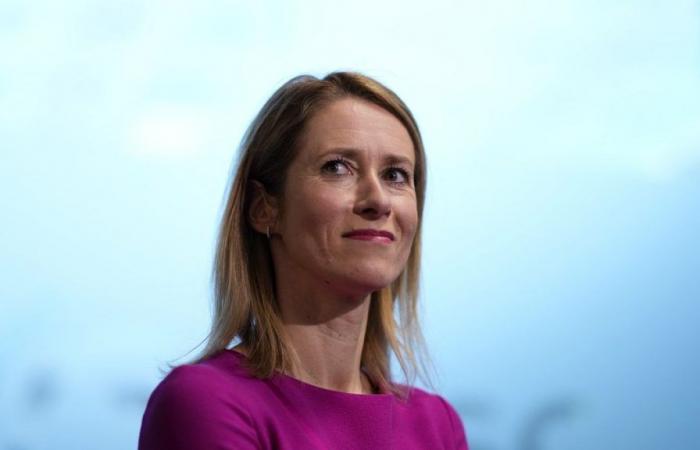Moscow has put a price on its head. Kaja Kallas is now wanted… in Brussels.
Estonian Prime Minister Kaja Kallas, one of the EU’s most vocal critics of Russia, is tipped to take the top foreign policy post in Brussels, which could send a signal strong in Moscow.
The 27 European Union leaders have put Ms Kallas, 47, on the list of candidates for the EU’s top diplomatic post, currently held by Spain’s Josep Borrell, and a final decision is expected this week.
If her nomination is made official by European leaders on Thursday and then approved by the European Parliament’s foreign affairs committee, she will become the first Eastern European to hold the post.
Since Russia launched its massive invasion of Ukraine in February 2022, Kaya Kallas has played a leading role in the EU’s efforts to punish Russia with sanctions, send military support to Ukraine and strengthen the Union’s defense capabilities.
The strength of his anti-Russian stance, which dates from before the war, has given rise to speculation that his candidacy for chief diplomat may be blocked for fear of provoking Moscow.
Her unequivocal response to Russian aggression even earned Ms. Kallas wanted status in Russia, in response to her efforts to remove Soviet-era monuments dating from World War II in her Baltic country, which the Kremlin called it a “hostile action against historical memory.”
But diplomats told Euronews that his ruthless stance towards Moscow was not a major obstacle to his nomination. Eastern European diplomats are particularly keen on bringing their own perspective to a European diplomacy that has been dominated for years by Western Europeans.
Her imminent appointment also comes despite the decline of the European liberal group to which she belongs, which has become the fourth political force in the European Parliament following the disappointing results obtained in the European elections in June.
Popular abroad, but losing popularity at home
The prospect of a move to Brussels comes as Ms Kallas faces a decline in her popularity ratings at home, although she maintains a strong international profile.
Her approval rating fell to 16% in January, following months of decline since last summer, when information about her husband’s business dealings with Russia first came to light.
In August 2023, it emerged that Ms Kallas’s husband, Arvo Hallik, had a stake in a logistics company that had continued to operate in Russia since the war in Ukraine broke out more than a year and a half earlier. Ms Kallas has since denied any knowledge of the company’s links to Russia and called the domestic reaction a political witch hunt.
But the scandal provoked little international reaction, except for a rant from Hungarian Foreign Minister Peter Szijjarto, who accused Ms. Kallas of “hypocrisy” when she censored the handle hand of Viktor Orbán with Vladimir Putin during a meeting in China.
Ms Kallas also came under scrutiny in March when EU diplomats accused her government of artificially inflating reimbursements for arms sent to Ukraine under the European Security Support Facility. Peace Fund (EPF), which allows Member States to be partially reimbursed for arms donations.
The amounts requested by Estonia exceed those of other member states that made similar donations, suggesting that Tallinn calculated its reimbursements based on the price of new military kits while sending older equipment to Kyiv.
The Estonian Foreign Ministry reacted to the reports, saying it had acted according to the rules and that Ukraine had “never complained” about the quality of the equipment it received from Estonia.
A “pragmatic” politician
One of the challenges facing Ms Kallas as she prepares to appear before the European Parliament’s Foreign Affairs Committee will be to demonstrate her skills when exercising the EU’s diplomatic influence in other parts of the world.
She is not considered an authoritative voice when it comes to other regions of the world, including Africa, the Middle East and Latin America. She could be tasked with defining the EU’s diplomatic position on the conflict raging in Gaza and the simmering instability in other regions such as Africa’s Sahel.
But diplomats said her track record of “pragmatic” policy means she is well placed to negotiate EU positions on global issues. This role is limited by the need for all EU member states to unanimously support foreign policy decisions. Ms Kallas is seen as having the skills to build consensus among the 27 foreign ministries, which are sometimes deeply divided.
These divisions came to the fore following the Hamas attack on Israel on October 7 and the ensuing offensive by Israeli forces in the Gaza Strip.
Estonia is seen as having toed the well-trodden EU line, which strongly supports Israel’s right to self-defense while calling for respect for international humanitarian law in Gaza. In short, Kaja Kallas is considered neither the most pro-Israeli nor the most pro-Palestinian of the EU leaders.
But it could have a lot to do to exert diplomatic influence and establish itself among its partners in the region. In fact, she mostly spoke about the instability in the Middle East by drawing parallels with the situation in Ukraine, questioning why the West could not repel Russian strikes on Ukraine in the same way as he did so when Iran launched its first-ever air attack on Israel in mid-April.
A family matter
Ms Kallas is no stranger to the European institutions. Her father, Siim Kallas, was Prime Minister of Estonia between 2002 and 2003 before leaving Tallinn for Brussels in 2004, where he served as Commissioner for ten years under José Manuel Barroso’s two executives.
A lawyer by training, Ms. Kallas entered politics in 2010 and, a year later, was elected to the Estonian parliament, the Riigikogu. She became a member of the European Parliament in 2014, where she focused on a range of policy areas, from technology to energy to foreign policy.
Since returning to Estonia and becoming Prime Minister in 2021, she has helped strengthen the international stature of her country, the fourth smallest state in the European Union, with just 1.4 million inhabitants. .
On her website, Ms. Kallas lists golf, skiing, roller skating and puzzles as her main hobbies.






